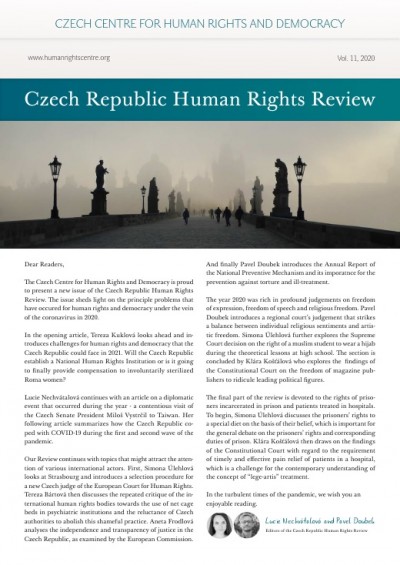You can download Czech Human Rights Review here.
The Czech Centre for Human Rights and Democracy is proud to present a new issue of the Czech Republic Human Rights Review. The issue sheds light on the principal problems that have occurred for human rights and democracy under the vein of the coronavirus in 2020.
In the opening article, Tereza Kuklová looks ahead and introduces challenges for human rights and democracy that the Czech Republic could face in 2021. Will the Czech Republic establish a National Human Rights Institution or is it going to finally provide compensation to involuntarily sterilized Roma women?
Lucie Nechvátalová continues with an article on a diplomatic event that occurred during the year - a contentious visit of the Czech Senate President Miloš Vystrčil to Taiwan. Her following article summarizes how the Czech Republic coped with COVID-19 during the first and second wave of the pandemic.
Our Review continues with topics that might attract the attention of various international actors. First, Simona Úlehlová looks at Strasbourg and introduces a selection procedure for a new Czech judge of the European Court for Human Rights. Tereza Bártová then discusses the repeated critique of the international human rights bodies towards the use of net cage beds in psychiatric institutions and the reluctance of Czech authorities to abolish this shameful practice. Aneta Frodlová analyses the independence and transparency of justice in the Czech Republic, as examined by the European Commission. And finally, Pavel Doubek introduces the Annual Report of the National Preventive Mechanism and its importance for the prevention against torture and ill-treatment.
The year 2020 was rich in profound judgements on freedom of expression, freedom of speech and religious freedom. Pavel Doubek introduces a regional court’s judgement that strikes a balance between individual religious sentiments and artistic freedom. Simona Úlehlová further explores the Supreme Court decision on the right of a muslim student to wear a hijab during the theoretical lessons at high school. The section is concluded by Klára Košťálová who explores the findings of the Constitutional Court on the freedom of magazine publishers to ridicule leading political figures.
The final part of the review is devoted to the rights of prisoners incarcerated in prison and patients treated in hospitals. To begin, Simona Úlehlová discusses the prisoners’ rights to a special diet on the basis of their belief, which is important for the general debate on the prisoners’ rights and corresponding duties of prison. Klára Košťálová then draws on the findings of the Constitutional Court with regard to the requirement of timely and effective pain relief of patients in a hospital, which is a challenge for the contemporary understanding of the concept of “lege-artis” treatment.
Content
- Czech Human Rights Challenges for 2021
- The President of the Czech Senate in Taiwan
- The COVID-19 Pandemic in the Czech Republic
- Selection Procedure for a new Czech Judge of the ECtHR
- Abolishment of Net Cage Beds: What is the Czech Republic waiting for?
- Independence and Transparency of Justice in the Czech Republic
- Annual Report of the National Preventive Mechanism: Prevention of Ill-Treatment in the Czech Republic
- Blasphemy or Freedom of Expression?
- “The Headscarf Affair”: Tolerance as a Civic Virtue
- The Pitomio Affair: Constitutional Court Holds that Freedom of Speech should not allow Arbitrary Ridicule
- Prisoners’ Rights to a Special Diet
- Timely and Effective Pain Relief as a Constituent of Lege Artis Treatment

